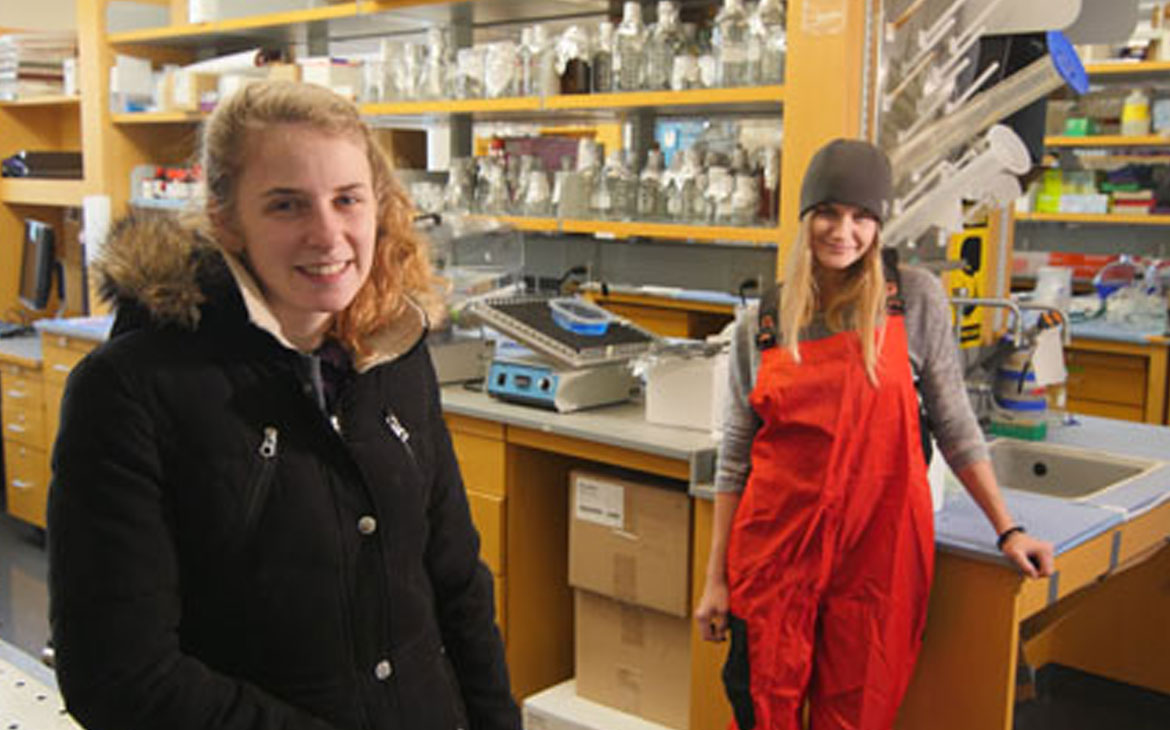“As soon as I heard that undergraduates could do this, I wanted to go.”
Taylor Dodge and Rachael Young, Rutgers University-New Brunswick seniors, are friends, roommates, South Jersey natives – and headed to opposite ends of Antarctica this month for separate research projects to gather data on the effects of climate change.
They will spend the Antarctic summer making the most of a challenge and opportunity they’ve both been eager to embrace since their first year in the School of Environmental and Biological Sciences.
Dodge, from Woodstown in Salem County, is headed for the West Antarctic Peninsula, the fastest-warming place on the continent, where she will spend six weeks at sea. She will collect krill – tiny crustaceans that are important food for many marine animals – for the Long Term Ecological Research project, which has been gathering data on the peninsula since 1990. Then, she’ll spend six weeks at Palmer Station, an American research station on the peninsula, helping to analyze the data and shed light on the impact of climate change on various species along the peninsula.
Young, from Ocean City in Cape May County, will spend 12 weeks at sea in Terra Nova Bay in the western Ross Sea, close to the International Date Line, gathering data on an ice-loving krill species – crystal krill, which serves as food for many fishes and birds. She and postdoctoral fellow Corie Charpentier will deploy a submersible robot glider with an echo sounder to determine the abundance of these creatures, their location in the water column and their relationship with other species in the food web. Her work is in support of Grace Saba, assistant professor of marine and coastal sciences.
Dodge and Young met as first-year students in the oceanography class taught by Rutgers University-New Brunswick marine scientists Oscar Schofield, Scott Glenn and Josh Kohut. They also were inspired by a documentary about Schofield’s work in the Antarctic.
“As soon as I heard that undergraduates could do this, I wanted to go,” Dodge said.
She applied twice to go to Antarctica, and wasn’t selected. “Then, this year, I applied again and kept my fingers crossed,” she said. “Just before I went to Europe this summer, I called and asked if I’d gotten it because I needed to know for planning purposes. I told Oscar I would take a leave of absence (from school) if I had to, so that he wouldn’t have to worry about my getting home in time to graduate. This time, I got it.”
Young is no stranger to research, having worked for two years with Saba on a fisheries-focused project on black sea bass and spiny dogfish at the National Oceanic and Atmospheric Administration’s laboratory at Sandy Hook. For her, that experience and her upcoming adventure are part of the advantage of attending a large research university. “I found out my first year that undergraduates could go to Antarctica, and I knew I had to go there,” Young said.
Dodge, a seasoned adventurer, is a volunteer firefighter with the East Franklin Fire Department in Franklin Township, Somerset County, and has traveled extensively in Europe, North America and South America. Antarctica will be her fourth continent, and she plans to visit all seven eventually. Despite a tendency to seasickness, she plans to join the Navy after graduation.
Article and Photo Credit: https://news.rutgers.edu/

